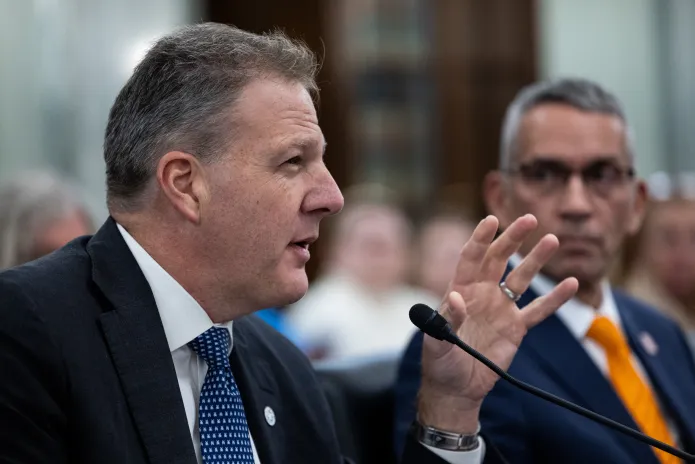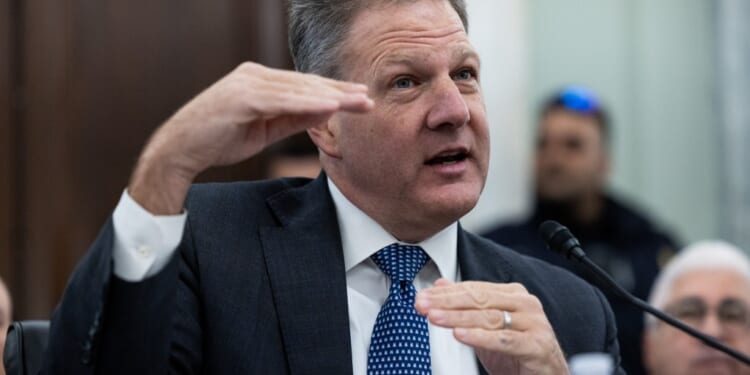At a Senate aviation subcommittee hearing, industry leaders, union officials, and aviation manufacturers described an exhausted workforce, mounting safety concerns, and deepening disruptions across the aviation supply chain. Chairman Jerry Moran (R-KS) said he was “pleased” that delays were easing ahead of Thanksgiving but warned that “lingering strain and fatigue on the system” should be expected as 31 million passengers prepare to fly next week.
Nick Daniels, president of the National Air Traffic Controllers Association, cast the shutdown as a breaking point for a chronically short-staffed workforce now responsible for “moving the most planes in the history of the world.” The system is operating with 10,800 certified professional controllers instead of the 14,633 required, a roughly 25% deficit that he said would prompt “any profession” to be “screaming for help.”
The prolonged lapse “showed time and time again” how “fragile the system is,” Daniels said, forcing controllers to work “full time and in many cases mandatory overtime” while receiving “one partial paycheck and two $0 paychecks.” The financial strain, he said, triggered a first-ever wave of trainees quitting mid-program at the FAA Academy in Oklahoma City because they couldn’t afford to finish training, relocate to high-cost areas and “pick up a career … that’s not going to pay me.” Mid-career controllers also walked away, he added, “saying ‘enough’s enough.’”
Daniels said the financial stress and nonstop pressure took a profound mental health toll, noting that at least one air traffic controller died by suicide during the shutdown, a tragedy he said underscored how essential it is for Congress to stabilize funding and support a long-overdue reform of the FAA’s medical and mental-health system. Moran later acknowledged “another air traffic controller who took their life” during the lapse.

Former New Hampshire Gov. Chris Sununu, now president of Airlines for America, said the shutdown turned into a “24-hour nonstop logistical nightmare” for carriers as controller shortages climbed. Flight delays tied to staffing typically account for about 5% of overall delays, he said, but during the first month of the shutdown, that number “tripled to 16%.” By early November, cancellations were soaring and airlines were absorbing about $50 million a day in refunds alone, costs that rippled across the broader economy. “Some estimates are clocking it at a $20 billion hit to America’s GDP,” he testified.
Industry leaders also urged Congress to fully fund modernization efforts that stalled during the shutdown. Jim Viola of the General Aviation Manufacturers Association said the lapse “significantly disrupted” certification work, halted new safety and technology projects, and left about 600 FAA engineers, pilots, and inspectors in hiring limbo. “Shutdowns are not easily recovered from,” he said.
The hearing also veered briefly into the partisan fight that sparked the shutdown itself. Sen. Tammy Duckworth (D-IL) tied the lapse directly to Republicans’ refusal to renew enhanced Affordable Care Act subsidies, pointing to testimony from Kansas resident Eileen Spickler, a cancer survivor who said her family will go uninsured for two months next year because their tax-credit-supported plan is becoming unaffordable. Spickler told senators the subsidies were “life and death for us” and that without them, they could not have afforded coverage.
Duckworth pressed Daniels on why he did not ask the FAA or the Department of Transportation to find a way to pay controllers during the shutdown, as the administration did for military service members. “If Trump cared about controllers being paid, he would have paid them,” she said, accusing the administration of political gamesmanship. Daniels replied that he “did not have a specific conversation” with the FAA or DOT about reprogramming funds but said “paying air traffic controllers is essential” and that he would “welcome any chance to pay air traffic controllers for the work that they’re doing.” Duckworth further noted that she and Rep. Rick Larsen (D-WA) spent weeks trying to obtain the FAA data the administration cited in ordering airlines to cut flights by up to 10%.
Sen. Maria Cantwell (D-WA), who chairs the full Commerce Committee, questioned whether the FAA and DOT followed congressional intent and pressed for transparency around the metrics that triggered the order. Cantwell also raised the question of whether shutdown-driven slowdowns revealed ways the system might operate more safely at lower flow rates, hinting at possible gaps in the pre-shutdown traffic model.
Despite the political clashes, witnesses from across the aviation sector agreed on what Congress must now do to stabilize the system. They urged lawmakers to pass the stalled Transportation-HUD appropriations bill, which funds FAA operations, hiring and technology upgrades; enact Sen. Moran’s Aviation Funding Stability Act, allowing FAA to draw from the Airport and Airway Trust Fund during any future shutdown so staffing, training, certification and paychecks continue uninterrupted; deliver the remaining $19 billion needed for FAA modernization on top of the $12.5 billion already appropriated; and move forward on mental health and medical certification reforms after the shutdown’s toll and recent suicides.
TRUMP ADMINISTRATION SCRAPS AIRLINE PAYOUT PLAN BEFORE HOLIDAY TRAVEL SURGE
Daniels said the path forward requires “a long-term commitment” to hiring and training the next generation of controllers, deploying new tower simulators Congress already funded, and building a system resilient enough to withstand emergencies without forcing workers to choose between safety and survival. Sununu added that modernization “has to be the whole thing,” not “one piece of the puzzle,” warning that without sustained investment, “the uncertainty added to the system could be really detrimental for years.”
Moran closed the hearing by telling the witnesses that he would relay their concerns to his colleagues. “Sometimes the circumstances of a tragedy are what motivate us to do our jobs better,” he said, calling consistent investment and long-term stability “the necessary step to modernizing our airspace.”
















